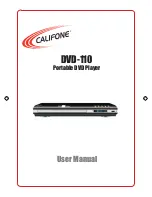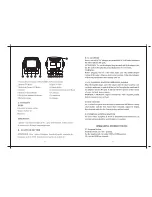
100416 - 8000W TRI-FUEL PORTABLE GENERATOR
IMPORTANT SAFETY INSTRUCTIONS
7
Fuel Safety
DANGER
GASOLINE, GASOLINE VAPORS, PROPANE AND NATURAL
GAS ARE HIGHLY FLAMMABLE AND EXPLOSIVE
Fire or explosion can cause severe burns or death.
Gasoline and gasoline vapor:
–
Gasoline vapors are highly flammable and explosive.
–
Gasoline vapors can cause a fire or explosion if ignited.
–
Gasoline is a liquid fuel and the resulting gasoline vapors can
ignite and cause a fire or explosion.
–
Gasoline is a skin irritant and needs to be cleaned up
immediately if spilled on skin or clothes.
–
Gasoline has a distinctive odor, this will help detect potential
leaks quickly.
–
In any petroleum gas fire, flames should not be extinguished
unless by doing so the fuel supply valve can be turned OFF.
This is because if a fire is extinguished and a supply of fuel is
not turned OFF, then an explosion hazard could be created.
–
Gasoline vapors expand and contract with ambient
temperatures. Never fill the gasoline tank past the red FULL
indicator on the fuel filter, as gasoline vapors needs room to
expand if temperatures rise.
Propane (LPG) Vapors:
–
LPG vapors are highly flammable and explosive.
–
LPG vapors under pressure and can cause a fire or explosion
if ignited.
–
LPG is a liquid fuel and the resulting vapors can ignite and
cause a fire or explosion.
–
LPG vapors are heavier than air and will settle in lower areas.
–
LPG itself is odorless and tasteless. A chemical is added to
give it an odor to help detect leaks quickly.
–
Always keep the LPG cylinder in an upright position.
–
LPG is a skin irritant and can cause severe cold burns similar
to frostbite. Alway wear proper personal protective gloves
when connecting to and disconnecting from a propane bottle.
–
If a leak is detected, IMMEDIATELY turn OFF the gas supply.
Natural Gas (NG) Vapors:
–
NG vapors are highly flammable and explosive.
–
NG vapors can cause a fire or explosion if ignited.
–
NG itself is odorless and tasteless. A chemical is added to give
it an odor to help detect leaks quickly.
–
NG is lighter than air and will collect in higher areas.
–
If a leak is detected, IMMEDIATELY turn OFF the gas supply.
When adding or removing gasoline:
DO NOT light or smoke cigarettes.
Turn the generator off and let cool for at least two minutes before
removing the gasoline cap. Always loosen the cap slowly to relieve
pressure in the tank.
Only fill or drain gasoline outdoors in a well-ventilated area.
DO NOT pump gasoline directly into the generator at the gas
station. Always use an approved container to transfer the fuel to
the generator.
DO NOT overfill the gasoline tank.
Always keep gasoline, propane and natural gas vapors away
from sparks, open flames, pilot lights, heat and other sources of
ignition.
BEFORE starting the generator:
DO NOT attempt to start a damaged generator.
Always check that the gasoline cap, air filter, spark plug, fuel lines
and exhaust system are properly in place.
Always allow spilled gasoline to evaporate fully before attempting
to start the engine.
Always check the connections of the supply hose for leaks before
using LPG or NG fuel.
Always be certain that the generator is resting firmly on level
ground.
When operating the generator:
DO NOT move or tip the generator during operation.
When transporting or servicing the generator:
Always check that the fuel valve is in the OFF position and the
gasoline tank is empty.
Always check that the supply hose is disconnected and stored
securely away from the generator after using LPG or NG fuel.
Disconnect the spark plug wire.
When storing the generator:
Always store away from sparks, open flames, pilot lights, heat and
other sources of ignition.
Never store generator, gasoline or LPG cylinders near furnaces,
water heaters, or any other appliances that produce heat or have
automatic ignitions.
DANGER
NEVER place a gasoline container, gasoline tank, LPG cylinder
or any combustible material in the path of the exhaust stream
during operation of the engine.
WARNING
Never use a gasoline container, gasoline tank, LPG connector
hose, LPG cylinder or any other fuel item that is broken, cut,
torn or damaged.








































